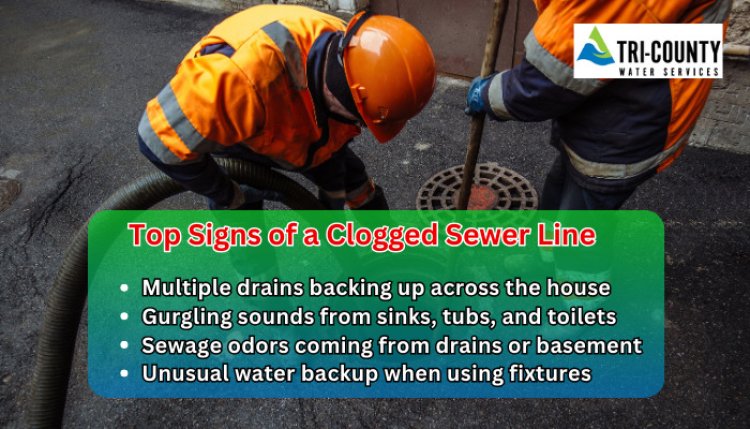4 Signs Your Main Sewer Line Is Clogged (And What to Do About It)
Share this Post to earn Money ( Upto ₹100 per 1000 Views )

Summary:
A clogged main sewer line can cause backups, foul odors, and major property damage. This blog covers the top four signs that your sewer line may be blocked, preventive measures, and why timely professional help for sewer lines is crucial.
Introduction:
Your home's plumbing is a complex network, but all of it depends on one crucial piece: the main sewer line. When this line becomes clogged, the results can be disastrous, affecting multiple drains, causing unpleasant smells, and even leading to structural damage. Recognizing the early warning signs can help you act before things get worse. Here are the four main signs that your main sewer line might be clogged and what steps you should take.
1. Multiple Drains Are Backing Up
One of the clearest signs of a main sewer line clog is when several drains in your home begin to back up simultaneously. You might notice slow-draining water in your kitchen sink, bathroom sink, bathtub, and even your toilet. Unlike isolated clogs, which usually affect just one drain, a main line clog disrupts your entire plumbing system.
What Causes This?
Common causes include tree root infiltration, buildup of grease, soap scum, and debris, or non-flushable items making their way into your pipes. These materials block the flow of wastewater, causing it to come back up through the drains.
What to Do
Stop using water fixtures immediately to prevent further backups. Contact a professional plumbing service to inspect and address the issue. Ignoring the problem will only lead to more severe (and expensive) damage.
2. Unusual Reactions When Using Plumbing Fixtures
If you notice odd reactions when using your plumbing fixtures, it's a strong sign something is wrong. Examples include flushing your toilet and seeing water bubble up in your shower, or running the washing machine and noticing your toilet overflows.
Why This Happens
A clog in the main sewer line forces wastewater to seek alternative exit points. Since it can't flow freely to the municipal sewer system or septic tank, it reverses course and exits wherever it can — often places you don't want it to.
Immediate Steps
Stop using your water supply and call for professional assistance. Experts often use cameras to inspect the sewer line and locate the blockage quickly and precisely. If necessary, they’ll recommend sewer line repairs to restore proper drainage.
3. Gurgling Sounds from Drains
Gurgling or bubbling sounds coming from your sinks, toilets, or bathtubs when you use other fixtures signal trapped air caused by a blockage. This strange noise is a symptom of restricted water flow somewhere deep within the plumbing system.
Common Scenarios
-
Flushing the toilet causes gurgling noises in the sink.
-
Running the dishwasher creates bubbling sounds in nearby drains.
Recommended Action
Although gurgling might seem minor, it typically points to a significant problem like a main sewer line clog. Early intervention is key. A trusted plumbing expert can diagnose the issue before it escalates into a full-blown backup requiring major sewer line repairs.
4. Presence of Sewage Odors
Persistent foul odors in or around your home, especially near drains or in the basement, are another red flag that your main sewer line might be compromised. The smell of sewage is not only unpleasant but also dangerous, signaling a potential health hazard.
Potential Causes
-
Cracks or leaks in the sewer line allowing gases to escape.
-
Blockages causing sewage to back up and emit odors.
What You Should Do
Do not ignore sewage smells. They indicate that your plumbing system is compromised and may be exposing your family to harmful gases. Call a qualified professional to inspect your system immediately and recommend repairs.
The Importance of Timely drainage repair
Handling sewer line problems quickly is essential to prevent extensive water damage, contaminated environments, and extremely high repair bills. If you delay repairs, minor clogs can evolve into broken pipes and damaged home foundations.
Early detection and swift sewer line repairs can save you thousands of dollars and spare you from the inconvenience of major plumbing disasters.
Preventive Measures to Avoid Sewer Line Clogs
While not all sewer line clogs are preventable, good habits can minimize the risk dramatically.
-
Never pour grease down drains: Grease solidifies and clogs pipes.
-
Install drain covers: Catch hair and debris before they enter your plumbing system.
-
Flush responsibly: Only toilet paper and waste should be flushed.
-
Schedule regular inspections: Early detection of issues prevents major problems later on.
Routine maintenance is far less expensive than emergency repairs, and it helps extend the life of your home's plumbing system.
External Resource for Further Reading
If you’d like to explore more about sewer systems and their critical role in public health and safety, you can visit this Wikipedia article on sanitary sewers.
Final Thought
Identifying a clogged main sewer line early can save you significant time, money, and stress. If you notice any of the warning signs — multiple backups, strange gurgling sounds, unexpected fixture reactions, or sewage smells — it’s essential to act quickly.
When you need professional, reliable service for Sewer Relining, you can count on Tri County Water Services to handle the job right. Protect your home, health, and investment by addressing sewer line problems as soon as they arise.















